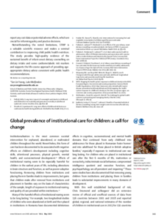Displaying 141 - 150 of 721
In this commentary piece for The Lancet Psychiatry, Joan Kaufman highlights some key findings and recommendations from the Lancet Group Commission on the institutionalisation and deinstitutionalisation of children.
The aim of the present study was to provide understanding into the past and present experiences of individuals who had resided in a child-care institution during their childhood and/or adolescence and to contribute to the study of the long-term impact of institutional care on adult life.
The first aim of this study was to examine differences in the socio-emotional functioning of adopted and institution-reared children in Chile. The second aim of this study was to examine the influence of adoption related variables on the psychological adjustment of adopted children.
Using 20-year follow-up data from a unique natural experiment – the large scale adoption of children exposed to extreme deprivation in Romanian institutions in the 1980s – the authors of this paper examined, for the first time, whether such deficits are still present in adulthood and whether they are associated with deprivation-related symptoms of attention-deficit/hyperactivity disorder (ADHD) and autism spectrum disorder (ASD).
In this study, the authors examined (a) whether institutional rearing is associated with continued social communication (SC) deficits into adolescence; (b) whether early placement into foster care mitigates risk for SC problems; and (c) associations between SC and psychopathology from middle childhood (age 8) to adolescence (age 16).
This study examined the impact of adrenocortical activity and post-adoption parenting on disinhibited social engagement (DSE) across the first two years post-adoption (age at adoption: 16–36 months) and observed kindergarten social outcomes in previously institutionalized children compared to non-adopted children.
This comment piece by Charles H Zeanah and Kathryn L Humphreys accompanies a study on the number of children in institutional care around the globe, entitled 'Prevalence and number of children living in institutional care: global, regional, and country estimates,' published in the Lancet in March 2020.
This scoping review adopts a descriptive focus to compile and analyze those studies published between 2007 and 2017 that have assessed the impact of situations of vulnerability or institutionalization on linguistic and communicative development.
The purpose of this study was to investigate the emotional and behavioral problems of children living in child care institutions (CCIs) in Kandy District, Sri Lanka, and to explore associated factors.
In this study, autobiographical memory tests, working memory, and a depressive symptom assessment were administered to 48 adolescents in care with a history of maltreatment (22 abused and 26 neglected) without mental disorder, who had been removed from their family and were living in residential child care, and to 61 adolescents nonmaltreated who had never been placed in care.

